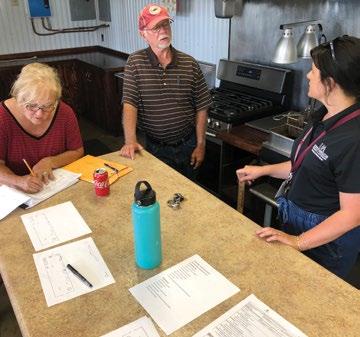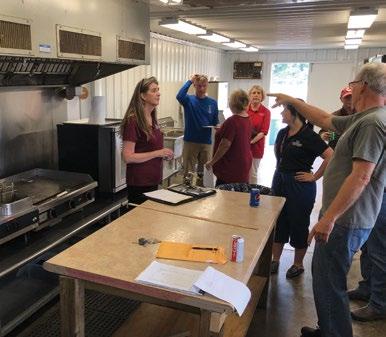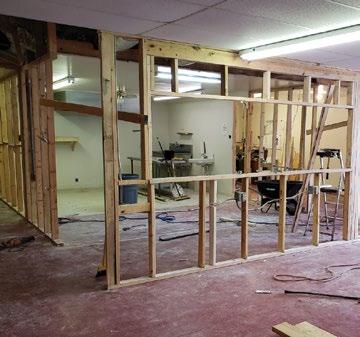
3 minute read
Shared Kitchens are a Hot Commodity
from Arkansas Grown
Farmers, Food Entrepreneurs All Find Room to Work at Share Grounds
As communities work to grow their local food scenes, food hubs are a tremendous resource for food entrepreneurs needing commercial kitchen space and farmers needing aggregation space to wash, package, and store their produce before distribution. The question has been where to find that space? The University of Arkansas System Division of Agriculture Cooperative Extension Service (Extension) found an answer at county fairgrounds across the state. “We realized they had commercial kitchens, warehouses, and roads accessible to large trucks - the basic infrastructure needed for food hubs,” said Amanda Philyaw Perez, assistant professor and extension food systems and safety specialist. Outside of county fairs and rodeos, some of those fairground facilities are underutilized, and their associations are open to ways of generating more revenue. Thus, the idea for Share Grounds was born. “The name is a clever spin on what we intend to do, and that is to work with each of the sites to modify and update their kitchens so they can move from a retail space designed for concessions sales to a food manufacturing kitchen,” Perez said. Share Grounds is operating in Cleveland, Searcy, and Woodruff counties this year where fairground facilities have been upgraded, equipped, and inspected. New stoves have been installed along with three-compartment sinks, produce-washing sinks, and washable walls. Electrical and plumbing upgrades have been made, and larger floor drains were installed. Future equipment purchases will be determined by the needs of initial clients. Each site has a local advisory board, and the goal is to have five food businesses and a connection to 15 farms per site in 2020. “We are confident we will meet this goal,” Perez said. Extension received a USDA Local Foods Promotion Program grant for the program and received additional grants, including a $45,000 grant from the Arkansas Community Foundation. Extension staff hosted introductory workshops at each site in the fall for interested entrepreneurs to learn more about the program.
Advertisement
“We want to work with people interested in using fresh foods to create value-added products,” Perez said. An example might be a grower who uses surplus peppers, onions, and tomatoes to make salsa. “That’s hard to do at home,” Perez said. “You can make it and give it away for free, but you can't sell that product out of your kitchen due to the food safety risk. Anyone interested in scaling up a recipe can use our kitchen to do that.” Each shared kitchen site will have a part-time manager who will assist with recipe testing, product development, regulatory assistance, kitchen rental, and cold and dry storage rental. The centers will be open 20 hours per week initially, and clients will pay an hourly rate of $30 or less for use of the facility, depending on the service used. Share Grounds also will benefit farmers and growers wanting to supply produce locally to farm-to-school programs or mom-and-pop grocery stores. The aggregation centers will provide space for producers “We want to work with people interested in using fresh foods to create value-added products.”
Share Grounds is a partnership between the Cleveland, Searcy, and Three County Fair Associations, the University of Arkansas System Division of Agriculture, and several regional partners. The concept is modeled after the Arkansas Food Innovations Center, which is part of the Food Science Department within the Division of Agriculture.
For more information visit www.uaex.edu/sharegrounds.













